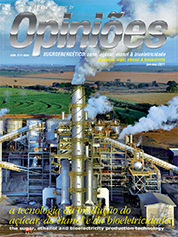Wokimar Teixeira Garcia
Coordinator of the R&D Laboratory at CTC
Op-AA-27
Quality
To speak of quality nowadays is very good. We live in times in which the quest for the best result in all aspects of a business is essential for success and for staying in the market. On the one hand, there is the client’s requirement that the product to be purchased be increasingly better and that it have a low price.
On the other hand, there is the requirement that industry increase production in shorter time intervals, with higher efficiency and lower costs. Thus, we are in a conflict of interests, in which there is only a common understanding when a global language is the focus of debate: quality.
What does one understand by quality? Quality can be defined from two perspectives: the viewpoint of the producer and the client. In the producer’s viewpoint, quality is associated with making a product that will meet the needs of the client. From the client’s perspective, quality is related to a product’s utility or use, and almost always to its price.
Thus, in the sugar-based energy industry, product quality translates into specifications defined by the client that, over the years, have evolved to the point that they have become demands that are not applicable to sugar and/or ethanol. Such demands imply the elaboration of lists of items ranging from a product’s visual characteristics, such as color and aspect, to minute elements measured in parts per billion, while also including physical aspects such as humidity, density and others.
Good old sugar, for many years a commodity and still viewed as such, in a certain way has a better status because the required quality standard is more uniform and most analytic procedures are established by Icumsa - International Commission for Uniform Methods of Sugar Analysis.
Since the 1990’s, with the spreading of globalization and the world’s need to find renewable energy sources (in this case, fuels that could replace fossil fuel), enormous demand for ethanol from sugarcane resulted, with ethanol still being the most viable source of renewable fuel. However, the world entered into an unprecedented debate in the history of ethanol as fuel, resulting in that specifications were defined ranging from the simplest to such that placed ethanol to be consumed in combustion engines in the same quality league as beverages.
Major efforts were made by Brazilian entities in international meetings, seminars and congresses, with the intent of standardizing requirements applicable to ethanol as fuel. In 2007, the “Bioetanol Task Force”, was created, a three-party group consisting of Brazil, the European Union and the United States.
Initially, this group’s aim was to reach consensus in setting minimum specifications coherent with the use of ethanol as fuel, just as we have specifications defined in Brazil by ANP (National Agency for Oil, Natural Gas and Biofuel), which adequately meet and guarantee the quality requirements of ethanol as fuel, taking into account the durability of engines and the product’s efficiency.
This effort resulted in a standard for some items such as color, aspect, conductivity, and sodium, sulphate, sulphur, copper and iron content. However, difficulties arose in terms of water content of anhydrous ethanol, so that in the end, it was impossible to set a “quality” standard for the international use of ethanol.
Another relevant item intrinsically tied to product quality is the question of who will measure such characteristics and guarantee the results. All efforts to standardize specifications and procedures make no sense if there is not someone who knows how to measure and can guarantee such results. From that results the need to standardize procedures internationally and to have qualified laboratories, so that the results achieved do not influence product quality.
CTC’s analysis laboratory has, for more than 40 years, been involved with this matter, making efforts to address this need, to this day measuring a broad range of items in sugar and ethanol, with the intent of guaranteeing product quality for the client. It is the largest laboratory in Brazil accredited by Inmetro in Brasil for testing (analytical procedures) sugar and ethanol.
We can certainly assure that Brazilian sugar and ethanol meet national and international specifications, a fact corroborated by the reality that Brazil nowadays is the largest exporter of sugar and a potential exporter of ethanol.In summary, we can state that the term quality, albeit abstract and wide ranging, is an issue that affects the sugar-based energy industry in aspects involving from the development of sugarcane varieties to end products.
It encompasses the quality of plantations, cutting, loading, transporting, equipment and processing conditions, inputs, purification, storage, loading and delivery to the client. Each of these items also entails a list of requirements that must be met, which, once they are met, warrant the quality of products according to the needs of each client.




